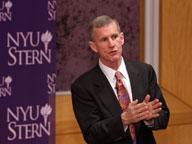Faculty News
—
In an op-ed, Prof. Nouriel Roubini outlines the risks to the global economy in 2013
—

Excerpt from Project Syndicate -- "The global economy this year will exhibit some similarities with the conditions that prevailed in 2012. No surprise there: we face another year in which global growth will average about 3%, but with a multi-speed recovery – a sub-par, below-trend annual rate of 1% in the advanced economies, and close-to-trend rates of 5% in emerging markets. But there will be some important differences as well."
Faculty News
—

Excerpt from Project Syndicate -- "The global economy this year will exhibit some similarities with the conditions that prevailed in 2012. No surprise there: we face another year in which global growth will average about 3%, but with a multi-speed recovery – a sub-par, below-trend annual rate of 1% in the advanced economies, and close-to-trend rates of 5% in emerging markets. But there will be some important differences as well."
















